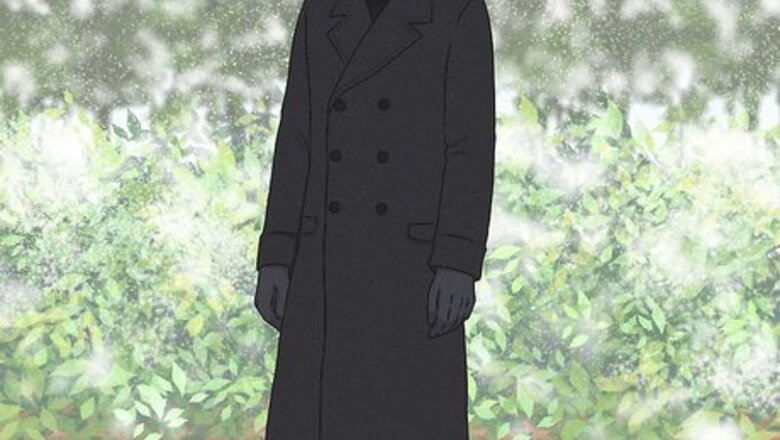
views
Picking the Best Overcoat
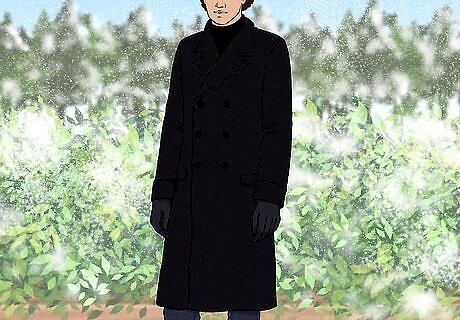
Choose a classic black overcoat for a simple, elegant look. Black is a universal color that looks good with almost any outfit you could wear. And don’t worry if most of your shoes are brown—the rule of thumb is to match your shoes to your belt, not your coat. Black overcoats can take a little more upkeep than other colors because they show every little bit of lint and hair. Keep a lint roller on hand so you can brush off your coat before you head out the door in the morning.
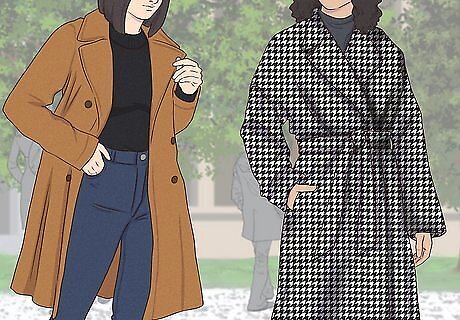
Spice up your look with a colored or patterned overcoat. Before buying, think about whether or not you could see yourself wearing a particular coat in 5 years. Because coats can last a long time, it makes sense to choose a color that you’ll enjoy wearing longterm. For example, brown, fawn, navy, and gray are great colors that won’t go out of fashion. A houndstooth weave or other kind of intricate weave could also add a splash of style to your coat without being too intense. Chances are, you aren’t going to feel the same way about an orange overcoat or one with red trim when it’s no longer in fashion. Remember, you can use your main outfit to express your unique fashion style while protecting it with a timeless overcoat.Tip: If you’re looking for a good deal on an overcoat, search your local antique and thrift stores. Instead of paying several hundred dollars for a new coat, you may be able to score one for a lot less.
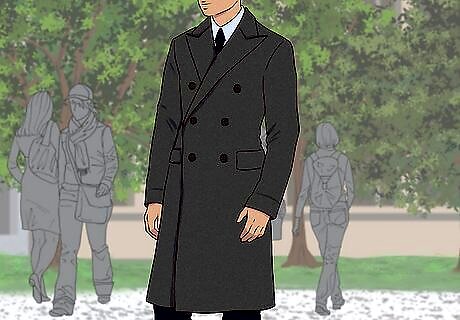
Get an overcoat that reaches to mid-thigh or your knee. A longer overcoat will keep you warmer during those cold winter days, but a slightly shorter one can look more stylized. In general, if you’re 6 feet (180 cm) or taller, get a longer overcoat that comes to your knees. If you’re 5.5 feet (66 in) or shorter, opt for one that hits at mid-thigh. When you sit down, your coat should still cover your behind. This will help protect your pants and keep you warm while you’re out and about.
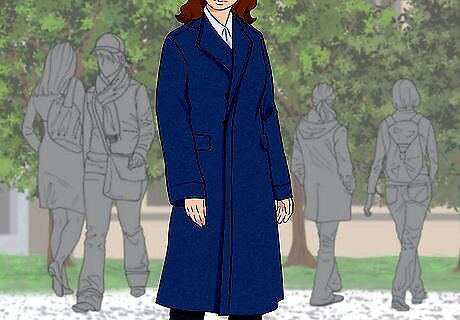
Invest in a button-up overcoat for an option that won’t go out of style. It may be tempting to get a coat that has a zipper, but that tends to automatically make your jacket look a little more casual. Similarly, avoid getting a jacket that both buttons and zippers. The extra step to close your jacket will be time-consuming and won’t provide any extra warmth. You can get a single- or double-breasted overcoat; just keep in mind that the double-breasted overcoat can’t be worn open very easily because of the extra fabric.
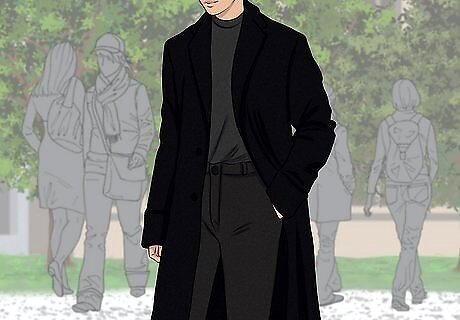
Pick an overcoat with sleeves that are long enough to cover your cuffs. Jackets and blazers are often designed to show off the very edge of your shirt cuffs, but an overcoat is made to keep you warm and to protect the clothes underneath it from the elements. If your overcoat’s sleeves are too short or too long, you may be able to have them altered so they’re the right length. The overcoat sleeves should be about 2 inches (5.1 cm) longer than your shirt sleeves. The shoulder seams should be as close as possible to the high point of your shoulder, so they're not drooping a few inches off the shoulder. Make sure the sleeves are not too long, otherwise you will look like you're wearing someone else's overcoat.
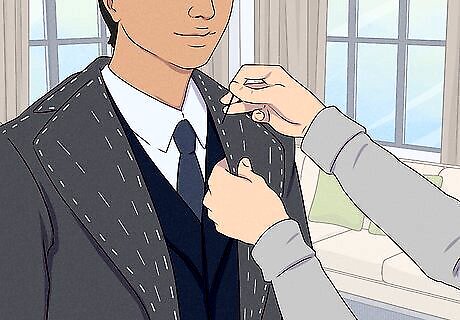
Get your overcoat tailored if it is too baggy in any areas. Remember, you’ll probably be wearing a few layers of clothes underneath your overcoat. When the coat is on, you should still be able to lift your arms, bend them, and sit down without the coat feeling too tight. If the shoulders of the coat fit well, you can have the rest of it tailored to fit perfectly.Tip: Wear a shirt and suit jacket to the store when you go to try on overcoats. This way, you’ll be able to tell if the size of the jacket will work.
Pairing Outfits with Your Overcoat
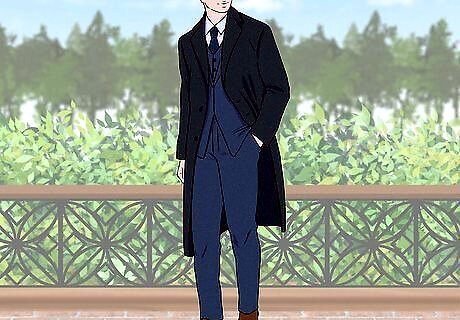
Wear the overcoat with a perfectly tailored suit for a formal look. There’s nothing wrong with wearing a blazer or suit jacket underneath of an overcoat, and sometimes it’s even essential depending on the weather outside. Just make sure that you can still lift and bend your arms comfortably with the extra bulk. This is a style that can look especially attractive with the overcoat left unbuttoned. It’s a great way to show off your nice suit underneath.
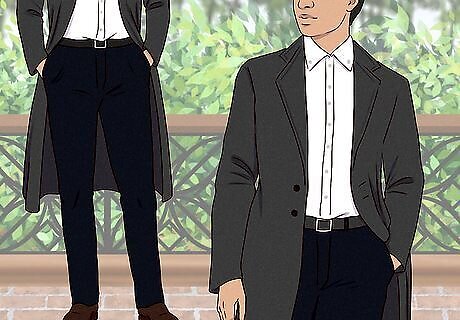
Pair the coat with nice trousers and a button-up shirt for an office-ready look. Even though you’ll have a coat on, keep your shirt tucked into your trousers. When you take off your overcoat, you want to look polished and ready to go. If your office is a little more professional, pair your trousers and button-up with a nice tie. You could even add a blazer if you wanted to. A plain white button-up shirt can look classy and professional, but don’t be afraid to experiment with different colors and patterns. As long as the shirt is clean and fits well, it can be worn confidently with an overcoat.
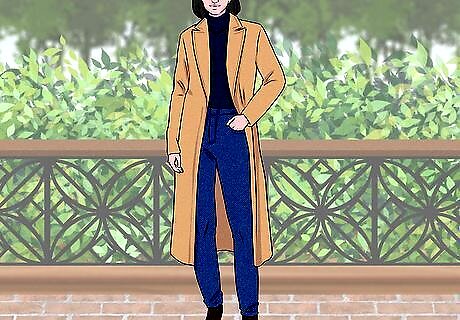
Dress down an overcoat by wearing it with casual pieces, like jeans. If you are going for a more casual look, try pairing the overcoat with a pair of fitted jeans and a nice button-up shirt or a sweater. Instead of wearing tennis shoes or athletic shoes, wear oxfords, loafers, or Chelsea boots. Don’t wear baggy, wrinkly, or fraying jeans. Ones that are fitted are going to look the best. Avoid pairing your jeans with a casual top, like a hoodie or a T-shirt. You need a more professional shirt, like a button-up or a nice sweater, to make the jeans work with the overcoat.
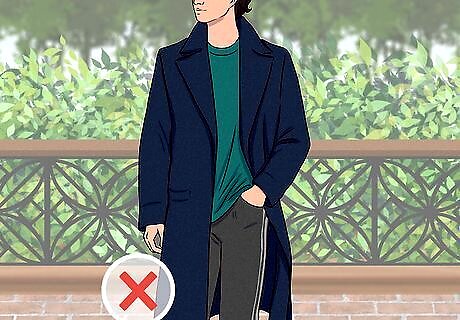
Avoid wearing an overcoat with athletic clothes or T-shirts. T-shirts, sweatpants, wrinkly jeans, athletic clothes, or other similar items will make you look frumpy, especially when contrasted with the elegance of an overcoat. Even if they are nice pieces, their style just won’t vibe with that of the overcoat. If you’re going to wear a T-shirt, sweatpants, athletic clothes, or something similar, opt for a fleece or down jacket instead.
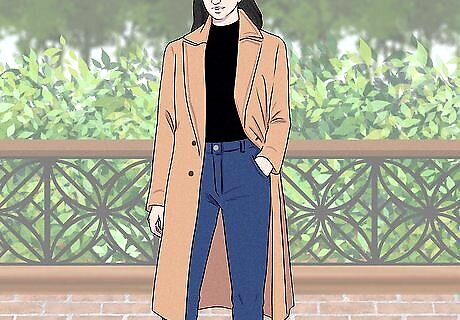
Keep your coat open to show off the outfit underneath. Obviously, this will depend on the weather—if it’s too cold, you’ll need to keep your overcoat buttoned while you’re walking outdoors. But if it isn’t too cold, you could unbutton your coat and let your fashion style show through. This is also a great transitional look when you are just getting in or getting ready to leave somewhere.
Adding Accessories
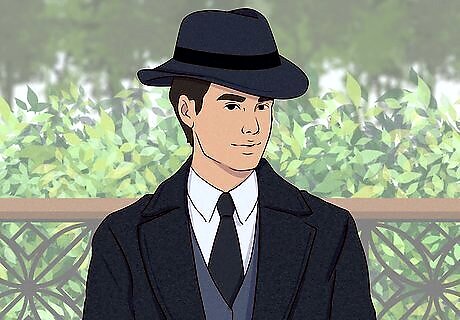
Create a complete look by adding a hat to your ensemble. Try wearing a fedora, a flat cap, or a newsboy cap. You could even wear a beanie—just make sure that it’s in good condition and a solid color so that it fits the look you’re going for. This isn’t just fashionable—it’s also functional! You’ll be able to stay warm for longer if your head is covered. Baseball caps are a no-go when wearing an overcoat.
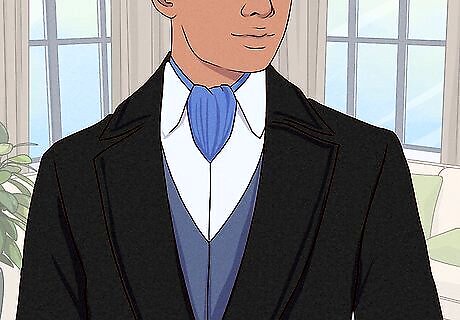
Add a splash of color with a cravat or a pocket square. A cravat is a wide piece of fabric worn around the neck that gets tucked inside your jacket where the top button is secured. A pocket square will work best in an overcoat that has an open pocket on the breast—if the pocket has a flap, a pocket square won’t work. These accessories don’t have to match the outfit you’re wearing underneath, though it’s okay if they do. You could even have a single cravat that you always wear with your coat for a unique statement piece, just like you might always wear the same scarf and gloves during the wintertime.
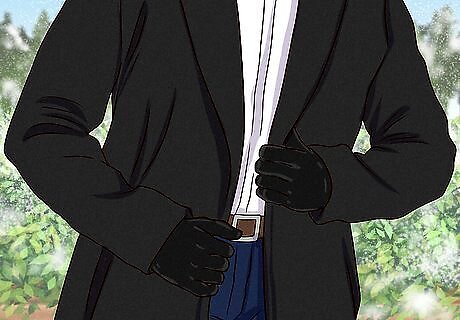
Stay warm and fashionable with leather gloves. For extra warmth, get leather gloves that are lined on the inside. Pick gloves that are a slightly different shade from your coat—for example, get black gloves to wear with a gray overcoat, or burnt orange gloves to wear with a chevron coat. Fleece and liner gloves will look too casual with your overcoat.
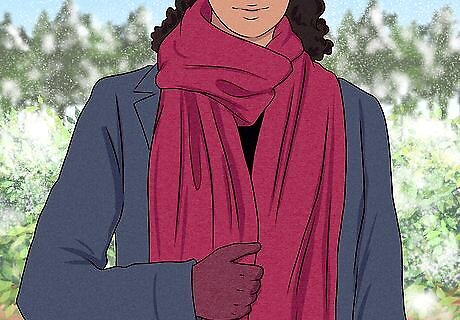
Throw on a wool scarf to keep your neck warm while you’re outdoors. The way wool looks will pair great with your overcoat. If you can, match the color of your scarf to the color of your gloves. After you wrap it around your neck, tuck the ends down inside your coat to keep them secure as you go about your business. If your overcoat is unbuttoned, leave your scarf undone, too.



















Comments
0 comment